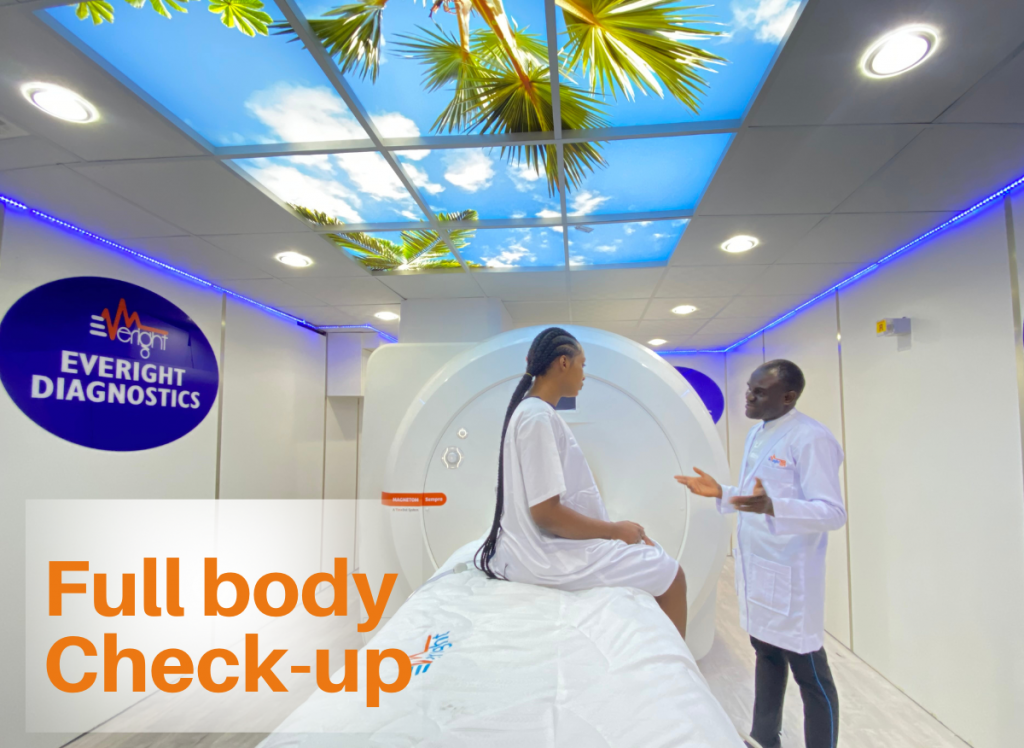- January 15, 2025
- Health Check
- By: Everight Diagnostics
- No Comments
Regular Healthchecks

The Importance of Regular Health Check-ups: Your Guide to Early Diagnosis
Did you know that up to 60% of chronic illnesses can be prevented with early diagnosis and timely intervention? Regular health check-ups are not just routine medical appointments, they are investments in your long-term health and well-being. These check-ups play a crucial role in identifying potential health issues before they become severe, helping you lead a healthier, more fulfilling life.
At Everight Diagnostic and Laboratory Services, we specialize in providing comprehensive diagnostic solutions that empower you to take charge of your health.
What Are Regular Health Check-Ups?
Regular health check-ups are medical evaluations conducted periodically to assess your overall health. These evaluations often include a variety of diagnostic tests such as blood tests, imaging scans, and routine physical examinations. They are designed to detect abnormalities early, offering a chance for timely treatment.
At Everightlab, we offer a wide range of tests tailored to your specific needs, ensuring that your check-up covers all the critical aspects of your health.
What Are Regular Health Check-Ups?
Regular health check-ups are medical evaluations conducted periodically to assess your overall health. These evaluations often include a variety of diagnostic tests such as blood tests, imaging scans, and routine physical examinations. They are designed to detect abnormalities early, offering a chance for timely treatment.
At Everightlab, we offer a wide range of tests tailored to your specific needs, ensuring that your check-up covers all the critical aspects of your health.
Why Are Regular Check-Ups Important?
Early detection
Many diseases, including diabetes, hypertension, and certain cancers, develop silently without noticeable symptoms. Regular check-ups help detect these conditions at an early stage when treatment is more effective and less invasive.
Preventing Health Complications.
By identifying risk factors early, you can take proactive steps to prevent complications. For instance, monitoring your cholesterol and blood pressure can reduce your risk of heart disease.
Peace of Mind
Knowing your health status gives you peace of mind and confidence to focus on other aspects of your life.
Key Tests to Include in Your Health Check-Up
A comprehensive health check-up typically includes:
- Blood Pressure Monitoring: Detect hypertension early.
- Blood Tests: Includes cholesterol levels, blood sugar, and complete blood count.
- Liver and Kidney Function Tests: Assess organ health.
- Cancer Screenings: Such as mammograms, Pap smears, and prostate-specific antigen (PSA) tests.
- Imaging Tests: X-rays, ultrasounds, and other scans to detect internal abnormalities.
Everight Diagnostics offers all these tests and more, with customized packages to suit individuals, families, and organizations.
How Often Should You Get a Health Check-Up?
The frequency of check-ups depends on factors such as age, medical history, and lifestyle. Here’s a general guideline:
- Under 40 Years Old: Once every 1-3 years.
- 40 Years and Older: Annually, or more frequently if you have a chronic condition or family history of illnesses.
Our medical officers at Everightlab can recommend an appropriate schedule based on your unique health profile.
Why Choose Everight Diagnostic and Laboratory Services?
When it comes to your health, you deserve the best care available. At Everight, we offer:
- State-of-the-Art Technology: Advanced diagnostic tools ensure accurate results.
- Comprehensive Services: From routine tests to specialized screenings.
- Expert Professionals: Our highly trained team ensures quality care.
- Convenient Locations: Find an Everight center near you for hassle-free access.
- Quick Results: Get your results promptly to plan your next steps.
Tips for Preparing for Your Check-Up
To make the most of your health check-up, follow these tips:
- Fasting Requirements: Some tests, like blood sugar and cholesterol, require fasting. Fast for at least 8 hours before the test (no food or drink). The best time to take the test is in the morning between 7-9am.
- Medication List: Bring a list of any medications you’re currently taking.
- Health History: Be ready to discuss your personal and family medical history.
Conclusion
Regular health check-ups are essential for maintaining good health and preventing serious illnesses. Don’t wait for symptoms to appear—be proactive and prioritize your well-being.

 Mr Everest Okpara is the chief advocate of the Company. He has been instrumental in making strategic decisions and policy formulations for the Company. He is known for being credible, courageous, focused, innovative, driven and result oriented. He holds an MBA degree in Business Administration and Management, B.Sc. in Industrial Relations and Personnel Management from the Lagos State University, a certificate in Healthcare Management from Lagos Business School and a certificate in Biostatistics and Epidemiology from Johns Hopkins Bloomberg School of Public Health, U.S.A. Mr Everest has been a force in investigative medicine for over seventeen (17) years. He is a philanthropist who has made extensive contributions to the social and economic development of his community.
Mr Everest Okpara is the chief advocate of the Company. He has been instrumental in making strategic decisions and policy formulations for the Company. He is known for being credible, courageous, focused, innovative, driven and result oriented. He holds an MBA degree in Business Administration and Management, B.Sc. in Industrial Relations and Personnel Management from the Lagos State University, a certificate in Healthcare Management from Lagos Business School and a certificate in Biostatistics and Epidemiology from Johns Hopkins Bloomberg School of Public Health, U.S.A. Mr Everest has been a force in investigative medicine for over seventeen (17) years. He is a philanthropist who has made extensive contributions to the social and economic development of his community.